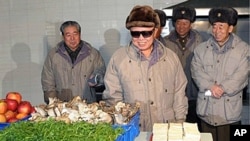The United Nations is warning of continued food shortages in North Korea where about one-third of the population is not receiving adequate nutrition. The latest food production report from a pair of U.N. agencies shows food production has increased only marginally over the past year.
North Korea needs more than half a million tons of imported grain in the next year to feed itself. That is the conclusion of two U.N. agencies after their latest mission to the isolated and impoverished nation.
The World Food Program and the Food and Agricultural Organization warn most of North Korea's people will continue to face food shortages.
They say international aid is the only way to adequately feed the North's 24 million people, a third of whom are under-nourished.
"We are hoping that donors will change their mind and support our programs so that we can separate the humanitarian issues from the political issues," said Victoria Sekitoleko, the FAO's regional representative.
Outside assistance has been minimal in the past few years. Sanctions on Pyongyang, because of its nuclear programs, have hampered efforts to attract food and other needed aid.
The U.N. agencies' report says their representatives recently visited food warehouses in seven of the country's 10 provinces and discovered no cereal stocks. Low-quality maize was available for distribution last month from the summer harvest but it was contaminated and too wet due to inadequate drying facilities.
In recent years, millions of North Koreans have gone hungry, and in the mid-1990s, hundreds of thousands died in a famine.
The WFP and FAO say international aid is needed to help five million of the most vulnerable North Koreans - children, pregnant and nursing women and the elderly.
The head of the WFP's food security unit warns of a "severe negative impact" if the chronic food deficits are not effectively managed should there be a "small shock in the future."
That is a reference to the precarious state of the country's agricultural sector and the economy.
Serious flooding in recent years has played havoc with harvests. Production of staple foods such as rice for this year rose just three percent from the previous year.
The FAO and WFP are recommending, in addition to food aid, that the international community support North Korea's farm sector to improve the country's food security in the short and medium term.
South Korea recently made its first shipment of donated food to the North since 2007. But the 5,000 tons of rice and three million packets of instant noodles pale in comparison to the half million tons of food aid shipped annually to North Korea under the previous administration here, which promoted the so-called Sunshine policy of engagement with Pyongyang.
The current South Korean administration says large-scale aid cannot resume until Pyongyang takes steps to get rid of its nuclear weapons.
UN: Millions of North Koreans Continue to Face Food Shortages




